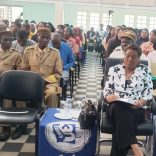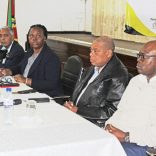Mozambique: Catholic Church concerned at child kidnapping - AIM
Mozambique: Bishop of Pemba calls for natural resource benefits for all, as members of Sovereign Fund Supervisory Committee are sworn in

FILE - For illustration purposes only. [File photo: Lusa]
The bishop of Pemba, the capital of Cabo Delgado, believes that ‘it would be a great injustice’ for the province not to benefit from its vast natural resources and is in favour of ‘ethical and integral’ management of the Mozambique Sovereign Fund (FSM).
‘The resources are in Mozambique, but it would be a great injustice if those close to these resources did not also benefit,’ António Juliasse said on Tuesday.
The bishop of Pemba was speaking to the media after being sworn in as a member of the FSM Supervisory Committee, representing the Episcopal Conference of Mozambique (CEM), an organisation of the country’s Catholic bishops.
Despite advocating that areas with natural resources take advantage of them, António Juliasse pointed out that this priority should not be the focus of conflict in the country because economic assets belong to all Mozambicans.
The bishop of Pemba defended the need for ethical, integrity and moral management of the revenues that will be deposited in the WSF.
‘The people expect the management of the sovereign fund to serve the entire Mozambican people, hence the need to ensure ethics, integrity and morality,’ said António Juliasse.
The bishop praised the fact that the nine members of the Sovereign Wealth Fund Supervisory Committee were chosen from various segments of society, including churches, academia, professional orders, civil society and employers’ organisations.
‘Our mission is to act in favour of the people of Mozambique, especially the poorest,’ he stressed.
The speaker of parliament, Esperança Bias, who swore in the members of the Sovereign Fund Supervisory Committee, defended the importance of transparent management of the revenues generated by natural resources in favour of the country’s social and economic development.
‘The Mozambican Sovereign Fund is an instrument for the sustainable management of non-renewable resources, which, among other objectives, should accumulate savings to benefit present and future generations,’ Bias emphasised.
In the first half of the year, the Mozambican state collected $114 million (€103.3 million) in oil and natural gas exploration revenues, which were invested in the new FSM.
According to data from the Ministry of Economy and Finance’s economic and social balance sheet on the implementation of the state budget from January to June, to which Lusa had access today, these revenues include $74.1 million (€67.2 million) from 2022 and 2023 and $39.8 million (€36 million) from the first half of the year.
On 15 December, the Mozambican parliament approved the creation of the FSM with revenues from natural gas exploration, which by the 2040s should reach $6 billion (€5.5 billion) a year.
Mozambique has three development projects approved to exploit the natural gas reserves in the Rovuma basin, which is classified as one of the largest in the world, off the coast of Cabo Delgado.
Two of these projects are larger and involve channelling the gas from the seabed to land, cooling it in a plant, and exporting it by sea in a liquid state.
One is led by TotalEnergies (Area 1 consortium), and work progressed until it was suspended indefinitely after an armed attack on Palma in March 2021. The French energy company declared that it would only resume work when the area was safe.
The other is the still unannounced investment that ExxonMobil and Eni (Area 4 consortium) led.
A third completed, smaller project also belongs to the Area 4 consortium and consists of a floating platform for capturing and processing gas for export directly at sea. It started in November 2022.
Cabo Delgado province, which has the largest natural gas reserves in the country, has been the scene of terrorist attacks since 2017, claimed by movements associated with the Islamic State.












Leave a Reply
Be the First to Comment!
You must be logged in to post a comment.
You must be logged in to post a comment.